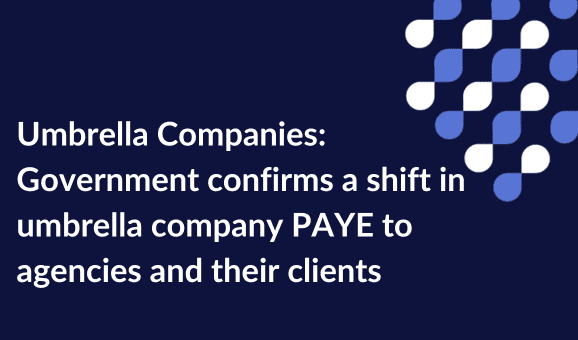

From 6th April 2026, agencies with a direct contractual relationship with end-user clients who use umbrella companies will become strictly liable to HMRC for shortfalls in the PAYE on umbrella company workers’ pay. This will be the case even if the umbrella company employs the worker and the shortfall is down to them. Strict liability means that HMRC only needs to identify a PAYE shortfall for an agency to be liable. This means that it will not be possible for agencies to raise a defence against liability, and HMRC will not consider any steps an agency took to ensure that an umbrella company they were using was making the correct PAYE payments to HMRC through due diligence checks. Whilst the wording joint and several liability is used in the draft legislation on these measures, HMRC has made it clear that it will pursue the party with the direct contractual relationship with the end-user client for liability and this is usually the agency.
Further developments expected in 2027 will see Umbrella Companies coming within the same compliance regime as agencies under the Employment Rights Act. With very little time to get to grips with the changes, now is the time to understand what’s coming and to prepare accordingly.
The REC will provide members with clear, practical information on the latest policy changes and announcements as more details emerge.
We are keen to hear your views on how you will respond to the umbrella company announcements to inform how we best support you. Contact campaigns@rec.uk.com to discuss.
How Umbrella Companies work Timeline
The latest updates Advice from Business Partners More support
For the REC’s take on the umbrella changes, members can view our exclusive webinar on demand, anywhere, anytime.
There is an increasing emphasis on the need to carry out due diligence.
The changes to PAYE obligations will mean that the agency that supplies an agency worker to the end client will be liable for any shortfall, whether they operated their payroll themselves or used the umbrella company to run payroll for them as of 6th April 2026.
Umbrella companies will fall within the legal definition of an employment business. This will mean that umbrella companies will bear some of the burden of ensuring that they are acting compliantly, however this doesn’t negate the need for recruitment businesses engaging with umbrella companies to conduct due diligence on umbrella companies they use.
Recruitment businesses should be cautious when exploring alternatives to umbrella companies. We strongly advise against entering into risky arrangements such as the joint employment model, which is likely to create compliance risks under the Conduct Regulations and is incompatible with the REC Audit Criteria. We explore the risks and opportunities available to recruitment businesses as a result of the announcements.

An Umbrella Company is a business entity that has a contract with an agency for the supply of workers it employs to the agency’s clients. The Umbrella Company employs the workers supplied to the clients under contracts of employment and is responsible for their employment rights, payroll and for ensuring that the correct tax and National Insurance Contributions are paid on their earnings.
This arrangement means that agencies do not currently bear the responsibility of employing the workers they supply to clients, this is particularly helpful to agencies that, for example, do not have the capacity to process payroll for agency workers.
In a typical Umbrella Company arrangement, the end-user client contracts a recruitment agency to supply temporary workers. The recruitment agency, in turn, enters into a commercial agreement with an Umbrella Company, which formally employs the worker.
The worker then signs an employment contract with the Umbrella Company but carries out assignments for the agency's end-user client. The end-user client pays the agency, which then pays the Umbrella Company. The Umbrella Company handles payroll, deducts taxes and National Insurance, and pays the worker. In this arrangement the Umbrella Company acts as an intermediary regardless of how the arrangement is labelled.
Some unethical variations, like Mini Umbrella Companies (MUCs), exploit tax loopholes by engaging workers through small, short-lived companies to avoid full tax obligations and to exploit tax reliefs available to small companies. These companies shut before they grow large enough to no longer be entitled to the tax relief before setting up new companies, never informing the workers that they supply that there has been a change in the legal identity of their employer.
Working with Umbrella Companies can expose organisations to several legal risks. Under the Criminal Finances Act 2017, businesses may be held criminally liable if they fail to prevent the facilitation of UK tax evasion (Section 45) or overseas tax evasion that is also a criminal offence under local law (Section 46).
Additionally, the Economic Crime and Corporate Transparency Act 2023 introduces liability for large organisations that fail to prevent fraud committed by associated persons.
Companies involved with non-compliant Umbrella Companies may also face debarment or exclusion from public sector contracts under the Procurement Act 2023, particularly if tax evasion or fraudulent activity is linked to their supply chain.
Finally, from 6th April 2026, agencies with a direct contractual relationship with end-user clients who use umbrella companies will become strictly liable to HMRC for shortfalls in the PAYE on umbrella company workers’ pay. This will be the case even if the umbrella company employs the worker and the shortfall is down to them. Strict liability means that HMRC only needs to identify a PAYE shortfall for an agency to be liable. This means that it will not be possible for agencies to raise a defence against liability, and HMRC will not consider any steps an agency took to ensure that an umbrella company they were using was making the correct PAYE payments to HMRC through due diligence checks.
This section of our Umbrella Company hub brings together resources that will assist you when engaging with umbrella companies.
The provisions regarding umbrella company regulation contained in the Employment Rights Act are scheduled to come into effect in 2027. See the Roadmap on Implementing the Employment Rights Bill.
On 6th February 2026, the government launched a consultation on bringing umbrella companies within the scope of the Conduct Regulations, as proposed by the ERA 2025. The consultation closes at 11:59pm on 1st May 2026.
In February 2026, the REC will be delivering expert-led sessions on tax and legal changes, including umbrella company compliance and PAYE obligations. In partnership with Qdos, we’ll break down the legislation, highlight the risks, and provide clear, practical steps your business can implement immediately to stay compliant. The sessions will be hosted in London, Birmingham and Manchester. More information, including booking details, can be found here.
On 16th December 2025, the Finance (no. 2) Bill, incorporating the Umbrella Company changes, was debated in the House of Commons.
The draft Finance (No. 2) Bill was published on 4th December 2025 and is currently going through the parliamentary process.
The briefing on 'Tax fraud warning for employment agencies and employers: tax credits reducing liabilities for employers', details awareness of new fraudulent models which are being marketed to employers and recruitment agencies offering ‘cheaper’ payroll services. REC Members should take note of this in light of the upcoming umbrella changes and introduction of joint and several liability from April 2026.
An umbrella company named Honest Payroll went into administration on 19 September 2025 and Companies House formally notified the public on 26 September 2025. Administrators have since received a claim from HMRC for almost £2.5 million, with £2.3 million relating to unpaid Value Added Tax (VAT) and £152,500 in VAT penalties and interest. Separate records show that the umbrella company also owes HMRC £62,600 in Pay As You Earn (PAYE) tax. Further information can be found here.
The draft legislation on PAYE liability for employment businesses when working with umbrella companies was published on Monday 21st July 2025 and may be found here. More information can be found on our latest publication 'Umbrella companies: Government confirms a shift in umbrella company PAYE to agencies and clients'. Watch our recent webinar on demand to understand what the new obligations on the horizon mean, how Umbrella Companies are legally defined and how to prepare your business accordingly.
In June, HMRC held a meeting with a number of stakeholders to provide an update on the proposed legislative changes due in force in April 2026 regarding PAYE liability for employment businesses when working with umbrella companies. Following the Tackling non-compliance in the umbrella company market consultation, HMRC had previously planned to go ahead to implement Option 3 of the proposals to tackle loss of tax income resulting from non-compliant activities by umbrella companies. This would have made the agency the employer for PAYE purposes, responsible for accounting for PAYE payments for their temporary workers/contractors (or a client where there is no agency in the supply chain). In the June meeting, HMRC confirmed that (subject to ministerial sign off) they will instead bring forward legislation that will allow the umbrella company to continue to be the employer for tax purposes, but that will hold both the agency and the umbrella company jointly and severally liable for any underpayment of tax. The agency will be first in the firing line.
Hive Umbrella Ltd was added to HMRC's list of named tax avoidance schemes, promoters, enablers and suppliers a few years ago and HMRC took action against Hive in respect of the Disclosure of Tax Avoidance Schemes (a scheme that obliges certain parties to give advance notice to HMRC that a tax arrangement could create a tax advantage). Hive created a ‘bonus scheme’ and ‘loan arrangement’ for contractors to be paid by – the effect of which was that there was an underpayment of PAYE, as the ‘loan’ payment would not have been taxable. The case was heard in the First-Tier Tribunal Tax Chamber and the judgment, which was handed down on 17 April 2025, can be found here. This case is a good reminder for members who use umbrella companies of the importance of rigorous due diligence, especially given the changes which are coming into force in April 2026.
On the 8th of April 2025, HMRC published new guidance on best practice for Umbrella Companies in the temporary labour market. The guidance:
The outcome of the Umbrella Company consultation was published. The amendments announced the government’s plan to legislate to define Umbrella Companies, allowing for their regulation and to bring them within the scope of the Employment Agencies Act 1973, meaning that they will be subject to regulation by the Employment Agencies Standard Inspectorate (EAS), which is due to become part of the ‘Fair Work Agency’.
Under this new Act, the exclusion regime has been extended to cover not only prime contractors but also entities within their supply chain. This means that if a non-compliant Umbrella Company is found to be in the supply chain of a recruitment business, the contracting authority may be required to exclude the recruitment business from the procurement process entirely.
HMRC published a tool aimed at providing guidance on carrying out compliance checks on companies within an agency’s labour supply chain, including intermediaries such as Umbrella Companies and personal service companies.
04 December 2024: Ducas Ltd Interim Freezing Order
The High Court issued an interim freezing order against Ducas Ltd, preventing the business from removing assets from the UK. HMRC took these steps due to alleged fraud relating to non-payment of employer national insurance contributions. Members can find further information on what action should be taken in response to that here.
30 October 2024: Autumn Budget 2024
In the 2024 Autumn Budget, it was announced that from April 2026 recruitment businesses will be made responsible for ensuring that Pay as You Earn (PAYE) tax is correctly applied to payments made to workers they supplying to clients via Umbrella Companies.
18 April 2024: Government plans for new statutory due diligence regime for employment businesses that use Umbrella Companies
The government provided an update that they are “…minded to” introduce a statutory due diligence regime for businesses that use Umbrella Companies and will continue to engage with the recruitment industry and other key stakeholders on the details of this.
30 November 2023: HMRC Guidance on ‘Responsibilities for employment businesses working with Umbrella Companies’
HMRC published guidance on how to protect your employment business, and the workers you supply, from non-compliant businesses in your supply chain.
06 June 2023 Consultation: Tackling non-compliance in the Umbrella Company market
The consultation was published in response to the Call for Evidence that closed on 22 February 2022. The consultation was seeking views from stakeholders on proposals to regulate umbrella companies, as well as views on options to tackle tax non-compliance in the Umbrella Company market.
30 November 2021: Call for Evidence: Umbrella Company market
The government’s call for evidence invited views from stakeholders on the role that Umbrella Companies play in the labour market, and how they interact with the tax and employment rights systems. It sets out concerns raised to tackle non-compliance and improve protection for workers.
REC members can exclusively contact our recruitment law experts via the legal helpline. The helpline receives more than 11,000 calls and 1,500 emails each year.
For REC Corporate members, help is always just a phone call or email away.